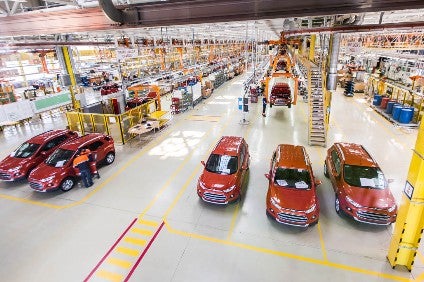
Ford Sollers has confirmed the closure of three passenger car assembly and engine plants in Russia as part of a restructuring which will refocus the venture on the Transit light commercial vehicle model line.
In a statement, Ford said the joint venture would stop selling passenger vehicles in Russia and concentrate on the Transit which is the best selling non-domestic commercial vehicle model.

Discover B2B Marketing That Performs
Combine business intelligence and editorial excellence to reach engaged professionals across 36 leading media platforms.
This would “help deliver a more competitive and sustainably profitable business going forward and support the company’s commitment to exit less profitable segments”, the automaker said.
Passenger vehicle production would stop by the end of June 2019 with closure of two vehicle assembly plants – Naberezhnye Chelny and St. Petersburg – and an engine plant in Elabuga.
St Petersburg builds the Focus and Mondeo, Tatarstan in Naberezhnye Chelny makes the Fiesta and Ecosport and the engine plant is on the same site as a third assembly plant in Elabuga, Tatarstan region, which produces the Kuga, Explorer and Transit.
Ford had announced in January it was putting the business under review as part of a broader restructuring of its loss-making Europe region while a Reuters report at the beginning of March said the automaker was considering closing two plants in Russia as part of its global plan to restructure operations in unprofitable regions. A similar report from Bloomberg on Tuesday (26 March) accurately predicted Ford’s official announcement today.
Ford said it had signed a memorandum of understanding (MOU) on a significant restructuring of the Ford Sollers joint venture, following a strategic review by the partners to improve the joint venture’s near-term profitability and investment efficiency in a challenging business environment. The MOU is expected to be finalised in coming months.
“This represents an important step towards Ford’s target to deliver improved profitability and a more competitive business for our stakeholders,” said Steven Armstrong, president, Ford of Europe.
“The new Ford Sollers structure supports Ford’s global redesign strategy to expand our leadership in commercial vehicles and to grow the business in Europe in those market segments that offer better returns on invested capital.”
Ford said the Russian passenger vehicle market had “been under significant pressure in recent years, with recovery slower than expected and a shift to lower priced passenger vehicle segments”.
This had resulted in the underutilisation of the JV’s manufacturing plants and inadequate returns on invested capital.
In contrast, sales of the Transit 2.0 tonne commercial vehicle in Russia continue to grow, with the model “acclaimed as Russia’s top-selling, non-domestic commercial vehicle nameplate with a segment market share of 15%”.
In the agreed new structure for Ford Sollers, Ford and Sollers PJSC continue in partnership, with Sollers PJSC taking a 51% controlling interest in the restructured joint venture.
“We look forward to starting the next chapter of our long-term partnership with Ford in Russia,” said Vadim Shvetsov, CEO Sollers.
“We believe our decision to focus on the Russian light commercial vehicle market will result in a stronger performing joint venture, and enables us to benefit from future market growth in this segment.”
“Significant employee separations are required and will be delivered through voluntary programmes to the fullest extent possible,” the statement said.
“While the actions we are announcing today are difficult, they are critical to ensure the long-term viability of the Ford Sollers business. The Transit line-up is the leader among foreign commercial vehicle brands in Russia, and has tremendous potential for further profitable growth in the years ahead,” said Adil Shirinov, CEO Ford Sollers.
Ford Sollers also confirmed it would continue to meet warranty and service requirements for existing and future owners of all Ford branded vehicles purchased in Russia.
Ford currently expects to record pre-tax special item charges of about US$450m to $500m in connection with the restructure.
The charges will include approximately $250m to $300m of non-cash charges, primarily for accelerated depreciation and amortisation, inventory and deconsolidation adjustments. The remaining charges of about $200m will be paid in cash and are primarily attributable to separation and termination payments for employees and suppliers.
Most of these pre-tax special item charges and cash outflows will be recorded in 2019 and are part of the previously announced $11bn in EBIT charges with cash related effects of $7bn Ford expects to take in the ‘redesign’ of its global business.
Ford’s 50-50 joint venture with Sollers dates back to 2011 and currently manufactures seven models.
There is capacity for 360,000 vehicles a year but it sold only 53,234 vehicles in Russia last year, up 5.7% from 2017 but well behind the 12.8% growth in Russia’s overall car market, while market share fell to 3% from 3.8% in 2013, according to a recent Reuters report.
Key competitors in Russia – Avtovaz, Volkswagen, Kia, Hyundai and Toyota – are seeing their share increase, and their sales outpace the market.






